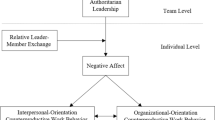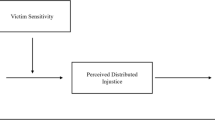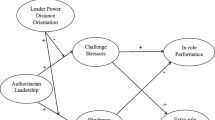Abstract
This article aimed to investigate the dark side of leadership behavior on counterproductive work behavior with the mediating role of emotional exhaustion and moderating effect of organizational cynicism. This study applied a PLS-SEM partial least square structural equation modeling technique to test the hypotheses on a sample of 345 police personnel of Pakistan. The results of this study indicate a positive and strong association between the despotic leadership and counterproductive work behavior. The findings show a positive and significant influence of despotic leadership on emotional exhaustion. Moreover, the results show an important and significant influence of the despotic leadership and counterproductive work behavior when the mediation role of emotional exhaustion is included. Furthermore, this study found an insignificant moderating influence of organizational cynicism in the relationship between despotic leadership and emotional exhaustion. Implications and limitations are also discussed in this article.


Similar content being viewed by others
References
Aiken LS, West SG, Reno RR (1991) Multiple regression: testing and interpreting interactions: sage.
Aravena F (2019) Destructive leadership behavior: an exploratory study in Chile. Leadersh Policy Sch 18(1):83–96
Bagozzi RP, Edwards JR (1998) A general approach for representing constructs in organizational research. Organ Res Methods 1(1):45–87
Banks GC, Whelpley CE, Oh I-S, Shin K (2012) (How) are emotionally exhausted employees harmful? Int J Stress Manag 19(3):198
Blickle G, Schütte N (2017) Trait psychopathy, task performance, and counterproductive work behavior directed toward the organization. Personality Individ Differ 109:225–231
Bolton LR, Harvey RD, Grawitch MJ, Barber LK (2012) Counterproductive work behaviours in response to emotional exhaustion: a moderated mediational approach. Stress Health 28(3):222–233
Brandes P, Dharwadkar R, Dean JW (1999) Does organizational cynicism matter? Employee and supervisor perspectives on work outcomes. In Eastern Academy of Management Proceedings 2:150–153 Philadelphia, PA
Braun S, Kark R, Wisse B (2018) Fifty shades of grey: exploring the dark sides of leadership and followership. Front Psychol 9:1877
Brender-Ilan Y, Sheaffer Z (2019) How do self-efficacy, narcissism and autonomy mediate the link between destructive leadership and counterproductive work behaviour. Asia Pac Manag Rev 24(3):212–222
Brown ME, Mitchell MS (2010) Ethical and unethical leadership: exploring new avenues for future research. Bus Ethics Q 583–616
Cai L, Murad M, Ashraf SF, Naz S (2021) Impact of dark tetrad personality traits on nascent entrepreneurial behavior: the mediating role of entrepreneurial intention. Front Bus Res China 15(1):1–19
Chen CCW, Wang CH (2019) Frontline employees’ passion and emotional exhaustion: the mediating role of emotional labor strategies. Int J Hosp Manag 76:163–172
Chen R, O. C., Boncoeur, O. D., & Ford Jr, D. L. (2020) Work engagement, emotional exhaustion, and counterproductive work behavior. J Bus Res 114:30–41
Chi NW, Yang J, Lin CY (2018) Service workers’ chain reactions to daily customer mistreatment: behavioral linkages, mechanisms, and boundary conditions. J Occup Health Psychol 23(1):58
Chin WW (1998) The partial least squares approach to structural equation modeling. Modern Methods for Business Research 295(2):295–336
Cropanzano R, Dasborough MT, Weiss HM (2017) Affective events and the development of leader-member exchange. Acad Manag Rev 42(2):233–258
Cropanzano R, Rupp DE, Byrne ZS (2003) The relationship of emotional exhaustion to work attitudes, job performance, and organizational citizenship behaviors. J Appl Psychol 88(1):160
Dalal RS, Carpenter NC (2018) The other side of the coin? Similarities and differences between organizational citizenship behavior and counterproductive work behavior. The Oxford Handbook of Organizational Citizenship Behavior 69–90
De Clercq D, Azeem MU, Haq IU, Bouckenooghe D (2020) The stress-reducing effect of coworker support on turnover intentions: moderation by political ineptness and despotic leadership. J Bus Res 111:12–24
De Clercq D, Haq IU, Raja U, Azeem MU, Mahmud N (2018) When is an Islamic work ethic more likely to spur helping behavior? The roles of despotic leadership and gender. Pers Rev 47(3):630–650
De Hoogh AH, Den Hartog DN (2008) Ethical and despotic leadership, relationships with leader’s social responsibility, top management team effectiveness and subordinates’ optimism: a multi-method study. Leadersh Q 19(3):297–311
Dean JW Jr, Brandes P, Dharwadkar R (1998) Organizational cynicism. Acad Manag Rev 23(2):341–352
Durrah O, Chaudhary M, Gharib M (2019) Organizational cynicism and its impact on organizational pride in industrial organizations. Int J Environ Res Public Health 16(7):1203
Dust SB, Resick CJ, Margolis JA, Mawritz MB, Greenbaum RL (2018) Ethical leadership and employee success: examining the roles of psychological empowerment and emotional exhaustion. Leadersh Q 29(5):570–583
Erkutlu H, Chafra J (2018) Despotic leadership and organizational deviance: the mediating role of organizational identification and the moderating role of value congruence. J Strateg Manag 11(2):150–165
Erkutlu H, Chafra J (2018b) Despotic leadership and organizational deviance: the mediating role of organizational identification and the moderating role of value congruence. J Strateg Manag 11(2):150–165
Fida R, Tramontano C, Paciello M, Guglielmetti C, Gilardi S, Probst TM et al (2018) ‘First, do no harm’: the role of negative emotions and moral disengagement in understanding the relationship between workplace aggression and misbehavior. Front Psychol 9:671
Fornell C, Larcker DF (1981) Evaluating structural equation models with unobservable variables and measurement error. J Mark Res 18(1):39–50
Grama B, Todericiu R (2016) Change, resistance to change and organizational cynicism. Studies in Business and Economics 11(3):47–54
Hair JF, Sarstedt M, Ringle CM, Mena JA (2012) An assessment of the use of partial least squares structural equation modeling in marketing research. J Acad Mark Sci 40(3):414–433
Hair JF Jr, Hult GTM, Ringle C, Sarstedt M (2016) A primer on partial least squares structural equation modeling (PLS-SEM): Sage publications.
Hair JF Jr, Ringle C, Sarstedt M, Gudergan SP (2017) Advanced issues in partial least square structural equation modeling. Sage Publications.
Han H, Quan W, Al-Ansi A, Chung H, Ngah AH, Ariza-Montes A et al (2020) A theoretical framework development for hotel employee turnover: linking trust in supports, emotional exhaustion, depersonalization, and reduced personal accomplishment at workplace. Sustainability 12(19):8065
Harman D (1967) A single factor test of common method variance. J Psychol 35(1967):359–378
Henseler J, Ringle CM, Sarstedt M (2015) A new criterion for assessing discriminant validity in variance-based structural equation modeling. J Acad Mark Sci 43(1):115–135
Ho VT (2012) Interpersonal counterproductive work behaviors: distinguishing between person-focused versus task-focused behaviors and their antecedents. J Bus Psychol 27(4):467–482
Hunter EM, Penney LM (2014) The waiter spit in my soup! Antecedents of customer-directed counterproductive work behavior. Hum Perform 27(3):262–281
Jabeen R, Rahim N (2020) Mediating role of perception of job insecurity on the relationship between despotic leadership and work engagement: Pakistani perspective. Review of Economics and Development Studies 6(2):277–288
Jiang Z, Hu X, Wang Z, Jiang X (2019) Knowledge hiding as a barrier to thriving: the mediating role of psychological safety and moderating role of organizational cynicism. J Organ Behav 40(7):800–818
Krischer MM, Penney LM, Hunter EM (2010) Can counterproductive work behaviors be productive? CWB as emotion-focused coping. J Occup Health Psychol 15(2):154
Lebrón M, Tabak F, Shkoler O, Rabenu E (2018) Counterproductive work behaviors toward organization and leader-member exchange: the mediating roles of emotional exhaustion and work engagement. Organ Manag J 15(4):159–173
Li C, Murad M, Shahzad F, Khan MAS, Ashraf SF (2020) Dark tetrad personality traits and counterproductive work behavior among doctors in Pakistan. Int J Health Plann Manage 35(5):1173–1192
Li C, Naz S, Khan MAS, Kusi B, Murad M (2019) An empirical investigation on the relationship between a high-performance work system and employee performance: measuring a mediation model through partial least squares–structural equation modeling. Psychol Res Behav Manag 12:397
Liu LH, Loi R (2012) The dark side of leadership: a three-level investigation of the cascading effect of abusive supervision on employee creativity. Acad Manag J 55(5):1187–1212
Liu WX, Zhao Y, Xia N, Guo S (2020a) Solving workplace deviant behavior in construction by leader–member exchange and leader–member Guanxi. J Constr Eng Manag 146(6):04020061
Liu Y, Hu X, Liu C, Chen T, He W (2020b) Work-related identity discrepancy and counterproductive work behavior: the role of emotional exhaustion and supervisor incivility. Int J Environ Res Public Health 17(16):5747
Miller JK, Peart A, Soffia M (2020) Can police be trained in trauma processing to minimise PTSD symptoms? Feasibility and proof of concept with a newly recruited UK police population. The Police Journal 93(4):310–331
Mo S, Shi J (2017) Linking ethical leadership to employee burnout, workplace deviance and performance: Testing the mediating roles of trust in leader and surface acting. J Bus Ethics 144(2):293–303
Murad M, Li C, Ashraf SF, Arora S (2021) The influence of entrepreneurial passion in the relationship between creativity and entrepreneurial intention. International Journal of Global Business and Competitiveness 16(1):51–60
Naseer S, Raja U, Donia MBL (2016a) Effect of perceived politics and perceived support on bullying and emotional exhaustion: the moderating role of type A personality. J Psychol 150(5):606–624
Naseer S, Raja U, Syed F, Bouckenooghe D (2018) Combined effects of workplace bullying and perceived organizational support on employee behaviors: does resource availability help? Anxiety Stress Coping 31(6):654–668
Naseer S, Raja U, Syed F, Donia MB, Darr W (2016b) Perils of being close to a bad leader in a bad environment: exploring the combined effects of despotic leadership, leader member exchange, and perceived organizational politics on behaviors. Leadersh Q 27(1):14–33
Naseer S, Syed F, Nauman S, Fatima T, Jameel I, Riaz N (2020) Understanding how leaders’ humility promotes followers’ emotions and ethical behaviors: Workplace spirituality as a mediator. J Posit Psychol 15(3):407–419
Nauman S, Fatima T, Haq IU (2018) Does despotic leadership harm employee family life: exploring the effects of emotional exhaustion and anxiety. Front Psychol 9:601
Neneh BN (2019) From entrepreneurial alertness to entrepreneurial behavior: the role of trait competitiveness and proactive personality. Personality Individ Differ 138:273–279
Nunally JC, Bernstein IH (1978) Psychometric theory. McGraw-Hill, New York
Pines A, Aronson E (1988) Career burnout: Causes and cures: Free press.
Podsakoff PM, MacKenzie SB, Podsakoff NP (2012) Sources of method bias in social science research and recommendations on how to control it. Annu Rev Psychol 63:539–569
Reynolds Kueny CA, Francka E, Shoss MK, Headrick L, Erb K (2020) Ripple effects of supervisor counterproductive work behavior directed at the organization: using affective events theory to predict subordinates’ decisions to enact CWB. Hum Perform 1–23
Sak R (2018) Gender differences in Turkish early childhood teachers’ job satisfaction, job burnout and organizational cynicism. Early Childhood Educ J 46(6):643–653
Saleem S, Yusaf S, Sarwar N, Raziq MM, Malik OF (2018) Linking abusive supervision to psychological distress and turnover intentions among police personnel: the moderating role of continuance commitment. J Interpers Violence 0886260518791592
Salvagioni DAJ, Melanda FN, Mesas AE, González AD, Gabani FL, Andrade SMD (2017) Physical, psychological and occupational consequences of job burnout: a systematic review of prospective studies. PloS One 12(10):e0185781
Sarstedt M, Cheah J-H (2019) Partial least squares structural equation modeling using SmartPLS: a software review. J Mark Anal 7(3):196–202
Schyns B, Schilling J (2013) How bad are the effects of bad leaders? A meta-analysis of destructive leadership and its outcomes. Leadersh Q 24(1):138–158
Shahzad F, Du J, Khan I, Shahbaz M, Murad M, Khan MAS (2020) Untangling the influence of organizational compatibility on green supply chain management efforts to boost organizational performance through information technology capabilities. J Clean Prod 266:122029
Sherwood L, Hegarty S, Vallières F, Hyland P, Murphy J, Fitzgerald G et al (2019) Identifying the key risk factors for adverse psychological outcomes among police officers: a systematic literature review. J Trauma Stress 32(5):688–700
Shinnar RS, Hsu DK, Powell BC, Zhou H (2018) Entrepreneurial intentions and start-ups: are women or men more likely to enact their intentions? Int Small Bus J 36(1):60–80
Tillman CJ, Gonzalez K, Crawford WS, Lawrence ER (2018) Affective responses to abuse in the workplace: the role of hope and affective commitment. Int J Sel Assess 26(1):57–65
Wang X, Guchait P, Pasamehmetoglu A (2020) Anxiety and gratitude toward the organization: Relationships with error management culture and service recovery performance. Int J Hosp Manag 89:102592
Woestman DS, Wasonga TA (2015) Destructive leadership behaviors and workplace attitudes in schools. NASSP Bull 99(2):147–163
Xia A, Wang B, Song B, Zhang W, Qian J (2019) How and when workplace ostracism influences task performance: through the lens of conservation of resource theory. Hum Resour Manag J 29(3):353–370
Yan M, Xie Y-P, Zhao J, Zhang Y-J, Bashir M, Liu Y (2020) How ingratiation links to counterproductive work behaviors: the roles of emotional exhaustion and power distance orientation. Front Psychol 11:2238
Yang C, Chen Y, Roy XZ, Mattila AS (2020) Unfolding deconstructive effects of negative shocks on psychological contract violation, organizational cynicism, and turnover intention. Int J Hosp Manag 89:102591
Ying L, Cohen A (2018) Dark triad personalities and counterproductive work behaviors among physicians in China. Int J Health Plann Manage 33(4):e985–e998
Zhang R, Redfern K, Newman MA, Ferreira-Meyers K (2016) If you are emotionally intelligent: the effects of customer-related social stressors on counterproductive work behavior for front-line service employees. Int J Sel Assess 24(3):260–271
Acknowledgements
We would like to thanks the police personnel’s who gave us data in a very effective manner and higher officers of police department who gave us permission to collect data.
Funding
This study was funded by X (grant number X). (Optional—could be left out in case no funding was received).
Author information
Authors and Affiliations
Contributions
Majid Murad and Wang Jiatong conceived the idea of the study and contributed to constructing the model, performing the analysis, interpretation of model results. Fakhar Shahzad supervised the project, and Nausheen Syed intensively edited the language of the manuscript. All the authors approved and read the final manuscript and participated in the critical appraisal of the manuscript.
Corresponding author
Ethics declarations
Ethics Approval
All procedures performed in studies involving human participants were in accordance with the ethical standards of the institutional and/or national research committee and with the 1964 Helsinki declaration and its later amendments or comparable ethical standards.
Informed Consent
Informed consent was obtained from all individual participants included in the study.
Conflict of Interest
The authors declare no competing interests.
Additional information
Publisher's Note
Springer Nature remains neutral with regard to jurisdictional claims in published maps and institutional affiliations.
Rights and permissions
About this article
Cite this article
Murad, M., Jiatong, W., Shahzad, F. et al. The Influence of Despotic Leadership on Counterproductive Work Behavior Among Police Personnel: Role of Emotional Exhaustion and Organizational Cynicism. J Police Crim Psych 36, 603–615 (2021). https://doi.org/10.1007/s11896-021-09470-x
Accepted:
Published:
Issue Date:
DOI: https://doi.org/10.1007/s11896-021-09470-x




